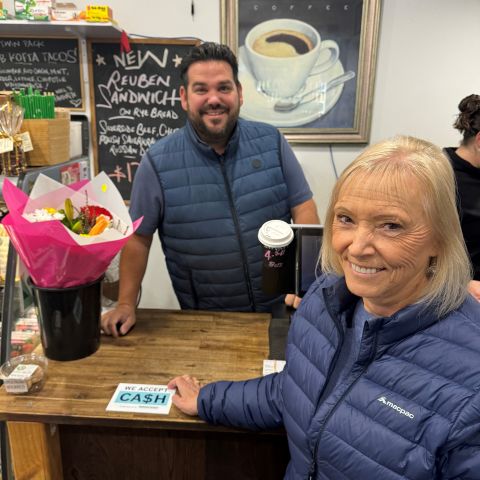Keep Cash
National Seniors is calling for cash to be accessible and accepted, to ensure seniors are not digitally excluded.


Support Keep CASH and win a $2,500 National Seniors Travel voucher
Here’s your chance to WIN a $2,500 National Seniors Travel Voucher in our Keep Cash Competition. Thousands have joined National Seniors Australia to spread the word to Keep Cash accessible and accepted - now it’s your turn!
Cash must be recognised as an important part of the financial and payments system.
All businesses should be subject to a ban on charging a surcharge for paying in cash.
All relevant businesses should be required to clearly post if they accept cash or not and any payment surcharges.

"The move towards a ‘cashless society’ is disproportionately impacting seniors who struggle with technology and online banking, highlighting concerns about digital exclusion.
Many seniors are not comfortable transacting online because they're not tech savvy, and they're concerned about online and credit card scams. In many cases, cash is all they're familiar with, and is their only way to make purchases.
Although online facilities are convenient for many of us, digital systems also pose risks during outages and natural disasters, highlighting the importance of cash being an option during emergencies.
Older Australians and First Nations communities, in particular, are also the most vulnerable to scams.
National Seniors is advocating for cash to be accessible and accepted."

Limited accessibility
There are parts of rural and remote Australia that have poor or no internet access including remote indigenous communities. Some households in these areas rely on satellite phones, or their communities or families share one smartphone between them. Another example of a limitation is accessibility to online banking due to infrastructure damage or power outages. Additionally, recent floods in Australia resulted in cash-only purchases of food and supplies which is another reason to keep cash circulating. Furthermore, there are limitations where victims of family and domestic violence are controlled, exploited, or sabotaged by an abusive family member in accessing credit cards, the internet, and other economic resources.

Credit card debt
Do you budget better with cash? Australians owe more than $41.4 billion in credit card debt, with additional $2.7 billion over the festive season.
Studies show we spend twice as much using cards because cash makes us more mindful. In a cost-of-living crisis, cash can encourage smarter spending.

There is a decline in cash transactions
The decline in the use of cash had been happening for some time before COVID-19 but was accelerated by the pandemic. By the end of 2022, the landscape of consumer payments had shifted dramatically, with cash transactions dwindling to a mere 13%, a steep decline from the 70% observed in 2007. Interestingly, despite the overall reduction in cash usage, one in five individuals aged 65 and older still predominantly rely on cash for more than 80% of their transactions. In a contrasting trend, approximately 40% of Australians now venture out without their wallets, credit, or debit cards, showcasing a growing reliance on digital payment methods. However, the significance of cash remains evident as, according to a survey conducted by the Reserve Bank of Australia (RBA), 25% of participants acknowledged that a lack of easy access to cash or difficulties in using it would pose a considerable inconvenience. This highlights the nuanced relationship Australians have with cash, balancing between the convenience of digital payments and the enduring need for physical currency.

Bank branches are closing
As the usage of cash continues to wane, consumers are facing a corresponding decrease in the availability of access points to withdraw physical money. Between June 2022 and 2023, a notable reduction was observed with 424 bank branches closing their doors. A significant portion of these closures, numbering 122 branches or 7%, occurred in regional areas, impacting the accessibility of banking services in less urbanized locations. This trend has been ongoing; since 2017, more than a third of bank branches have closed. Highlighting the continuation of this pattern, in January 2024, the National Australia Bank (NAB) announced its plan to close up to 36 branches across New South Wales, Queensland, Victoria, and Western Australia, further underscoring the banking industry's shift away from physical branches towards digital banking.

ATM machines are being removed
Between June 2022 and 2023, the landscape of cash accessibility witnessed a significant downturn, with an 11% decrease in the number of ATMs, resulting in more than 700 cash machines being decommissioned. This reduction in ATMs reflects a broader trend in cash withdrawals, which plummeted from $77.9 million in December 2008 to $29.7 million by June 2023. The decline has been stark since 2017, with the total count of ATMs across Australia dropping from 13,814 in June 2017 to 6,412 by June 2022—a reduction of 7,402 machines or 60% in just five years. Currently, the country hosts fewer than 6,000 ATM machines, marking a significant shift in how Australians can access their cash.

Cheques are being phased out
The Reserve Bank of Australia has signalled a clear message that the "days are numbered" for cheques, indicating an impending phase-out of this traditional payment method. This announcement is concerning for seniors and others who rely on cheques and are understandably apprehensive about the scarcity of alternative options. In line with this trend, banks are ceasing the creation of new chequing accounts. Furthermore, many banks have decided that existing accounts will not automatically receive replacement cheque books, marking a significant shift in the banking landscape and highlighting the gradual move away from traditional payment options.

Use more cash: There needs to be more cash transactions in the system for the government, banks, and retailers to take notice and understand that cash is important, especially for the older cohort.
Subscribe to National Seniors Connect Newsletter: To keep updated on our advocacy efforts to keep cash as a valid form of currency, slow down the closure of physical branches, and ensure there is appropriate training to support seniors with digital platforms.
Follow National Seniors on Facebook and LinkedIn: In addition, share our posts to show your support and keep this important message in front of policy advisors and decision makers.

Order your FREE Keep Cash stickers
As a crucial part of our ‘Keep Cash’ campaign, we are encouraging retailers who accept cash to display our ‘WE ACCEPT CASH’ sticker. We are also calling on community members to distribute stickers to local participating retailers.
In addition, we are encouraging supporters to display our 'Keep Cash' bumper stickers.
If you would like to order stickers, please fill out our request form linked below.

Support us in supporting you! To share with the NSA community of more than 240,000 members and supporters your support to ‘Keep cash’, while also promoting your business, we encourage you to take a photo of our sticker displayed in your store and upload it by clicking the button below.
We will list participating retailers on our website and share a selection of photos on our social media platforms. This is one way NSA can support retailers who support our members, and many older Australians, who use cash. Supporters who distribute stickers to businesses can participate too.

Get your own Keep Cash shirt!
Show your support for Keep Cash! Due to popular demand, we are offering you the opportunity to purchase one, or more, of our Keep Cash t-shirts. Save more when you purchase two. Be quick – the first 20 orders will receive FREE postage. Ordering is easy. For more details, or to place an order, visit our store page.

NSA has welcomed the proposed mandate for businesses selling essential items to accept cash.
Whether you have distributed "We Accept Cash" stickers, displayed stickers, liked or shared our social posts, or used cash – thank you for helping NSA’s movement to bring about this positive change.
We look forward to participating in the consultation and subject to the outcomes, welcoming the mandate when it is introduced in 2026.
Until then, please join or continue to support our KEEP CASH campaign and use cash at every opportunity. And consider becoming a member with NSA - people power does make a difference!
"Why would we want to give up cash? Just last week, three shops were unable to trade because their EFTPOS went down, or their WIFI wasn't working. The only person who could pay for their groceries was me because I had cash."
- Helly
"Another aspect of the move to being cashless is the relentless move by the banks to not only close branches but also remove ATMs. Added to this, the banks charge a fee for a 'tap and go' transaction. Surely, it is cheaper for businesses and banks to not have to deal with cash, so why should they charge a fee for a cost-saving?"
"Seniors, as well as those living with disability, may struggle with the transition to a cashless society with digital payment methods and technology. Many older adults are more comfortable using cash for their transactions as it’s a tangible, reliable, and familiar form of payment."
-Paisley

Access thousands of discounts with the EAT | PLAY | SAVE app
National Seniors members receive exclusive access to thousands of discounts on the EAT | PLAY | SAVE app – developed in partnership with Frequent Values by Entertainment. Save with thousands of discounts on dining, takeaway, shopping, gift cards, local services, and more!
Discounts are available Australia-wide and can be redeemed repeatedly, 365 days a year. This means members can enjoy discounts of up to 20% at their local participating eateries or attractions every day, even if they’ve used that discount previously.
For only $49.50 you can become a member online via the below button, or you can contact our friendly Membership team on 1300 76 50 50.


















































